UN Tourism | Bringing the world closer
Market intelligence.
- UN Tourism Data Dashboard
- UN Tourism World Tourism Barometer
- Impact of the Russian Offensive in Ukraine on International Tourism
- Publications on Tourism Market Intelligence
- Market Intelligence - Webinars
- COVID-19 and Tourism

share this content
- Share this article on facebook
- Share this article on twitter
- Share this article on linkedin
Impact of the Russian offensive in Ukraine on international tourism
UNWTO Tourism Market Intelligence and Competitiveness
Overall assessment of the impact on tourism

Added risk to a weak and uneven tourism recovery

Disruption of Russian & Ukrainian outbound travel
which accounts for some 3% of global spending = US$ 14 billion in 2020

Lower consumer confidence
particularly in more risk averse markets and segments

Impact on traditional destinations but also emerging ones
especially island and coastal destinations

Weaker economic growth and higher inflation
Higher oil prices + inflation + interest rates = higher travel costs for consumers & pressure on businesses, specially MSMEs

Threatens tourism-related jobs and businesses
impacting livelihoods
A risk to the ongoing recovery of tourism
First and foremost, the biggest concern is for the human tragedy unfolding in Ukraine. Our thoughts go to the people suffering from this conflict.
Russia’s military offensive in Ukraine represents a downside risk for international tourism. It has exacerbated already high oil prices and transportation costs, increased uncertainty and caused a disruption of travel in Eastern Europe.
The destinations most impacted so far (aside from Russia and Ukraine) are the Republic of Moldova with a 69% drop in flights since 24 Feb. (compared to 2019 levels), Slovenia (-42%), Latvia (-38%) and Finland (-36%) according to data from Eurocontrol. Russian bookings of outbound flights also plunged in late February and early March but have since rebounded according to data from Forwardkeys.
Despite the conflict, European air traffic has grown steadily from mid March to early May. Air bookings also show rising demand for intra European travel and for flights from the US to Europe.
The easing of travel restrictions are contributing to the normalization of travel (36 countries had lifted all COVID 19 related travel restrictions as of 13 May 2022) but the conflict continues to pose a serious threat to the recovery.
A possible loss of US$ 14 billion for the tourism economy
The military offensive risks hampering the return of confidence to global travel . The US and Asian source markets could be particularly impacted, especially regarding travel to Europe, as these markets are historically more risk averse.
As source markets, Russia and Ukraine represent a combined 3% of global spending on international tourism as of 2020. A prolonged conflict could translate into a loss of US$ 14 billion in tourism receipts globally in 2022.
In 2019, Russian spending on travel abroad reached US$ 36 billion and Ukrainian spending US$ 8.5 billion. In 2020, these values were down to US$ 9.1 billion and US$ 4.7 billion, respectively .
As tourism destinations, Russia and Ukraine account for 4% of international tourist arrivals in Europe but only 1% of Europe’s international tourism receipts .
The importance of both markets is significant for neighboring countries, but also for European sun and sea destinations. The Russian market gained significant weight during the crisis in long-haul destinations such as Maldives, Seychelles and Sri Lanka.
Russia and Ukraine's international tourism spending (% of world total)
Destinations with highest share of russian visitors (%) (various indicators) 2019-2021, european flights, january - april 2022 (% change vs. 2019), european countries with largest decline in number of flights 24 feb - 11 may 2022 (% change vs. 2019), air bookings for intra-european travel, january to may 2022 (index)*, air bookings for all outbound travel from russia january to may 2022 (index)*.
International tourist arrivals: 2020, 2021 and Scenarios for 2022 (monthly % change over 2019)
- Impact assessment, Issue 4 · 16 May 2022 (PDF)
- Impact assessment, Issue 3 · 28 April 2022 (PDF)
- Impact assessment, Issue 2 · 11 April 2022 (PDF)
- Impact assessment, Issue 1 · 24 March 2022 (PDF)

Press release
Ukraine: UNESCO estimates the damage to culture and tourism after 2 years of war at $3.5 billion
Press kit on UNESCO's actions in Ukraine
To date, the total cost of physical damage to the culture and tourism sectors in Ukraine is estimated by UNESCO at nearly $3.5 billion, compared to $2.6 billion a year ago, an increase of 40%.

UNESCO’s is the third assessment of the damage and needs since February 2022, which was carried out jointly by the World Bank, the Ukrainian government, the European Commission and the United Nations.
This estimate covers a total of 4,779 cultural and tourist assets reported as damaged by the Ukrainian authorities. This includes damage to sites and buildings of heritage value (estimated at $2.41 billion); damage to works of art, collections and cultural repositories ($161 million); damage to buildings and workshops dedicated to the cultural and creative industries ($262 million); and damage to tourism facilities ($650 million). The Kharkiv region was by far the worst affected, accounting for almost 25% of the damage recorded, followed by Donetsk region at 14.7% and Odesa region at 7.6%.
Since February 2022, the culture and tourism sectors have also accumulated lost revenues of $19.6 billion, representing an increase of 30% in one year. More than half of this loss - $10.6 billion – has been incurred by the city of Kyiv alone, mainly due to the fall in tourist numbers and the sudden slowdown of the creative industries.
According to UNESCO, nearly $9 billion will need to be raised between 2024 and 2033 to finance the recovery and reconstruction efforts. This funding requirement has increased by 30% in one year.
UNESCO has raised USD $66 Million to alleviate the emergency
To meet the most urgent needs, UNESCO has raised more than $66 million over the past 2 years from its Member States and the private sector. Japan alone has supported the Organization's efforts in Ukraine to the tune of almost $26 million . These funds have been used to implement dozens of short- and medium-term actions in the fields of culture, heritage, education and the media. The Organization has also opened a liaison office in Kyiv to coordinate all of its operations, currently staffed by a team of around twenty people.
Among other initiatives in the field of culture, UNESCO conducts following:
Preventing damage
Since spring 2022, UNESCO has been supporting the protection of cultural property by supplying emergency equipment and setting up risk management systems. It advises Ukrainian cultural professionals on protecting works of art and improving fire prevention systems. UNESCO has also begun to inventory and 3D-digitize cultural property in Kyiv, Lviv, Odesa and Chernihiv. This data will provide an essential documentary basis for reconstruction, and enhance UNESCO’s efforts to fight the illicit trafficking of cultural property, already being implemented through its training and coordination of the police and justice services at regional level .
Paving the way for reconstruction
UNESCO has initiated several consolidation and repair projects, including in Odesa at the Museum of Fine Arts, the Museum of Archaeology and the House of Scientists, as well as at several museums in Kyiv. In Odesa, whose historic centre has been on the World Heritage List since January 2023, the Organization will soon install a temporary roof on the Cathedral of the Transfiguration, thanks to support from Italy, to protect the nave from bad weather while reconstruction work is carried out.
Training 1600 cultural professionals
Over the past two years, UNESCO and its partners have trained more than 1,600 cultural professionals to build the capacity of national and local institutions throughout Ukraine, the majority of whose staff had never before been faced with emergency situations. The training included damage assessment, securing museum collections and historic buildings, and preserving living heritage.
Support for cultural life
UNESCO has funded residencies for nearly 100 artists in exile. It is also working to ensure the continuation of cultural activities in Ukraine. In order to achieve this goal, it has just awarded grants to 14 new artistic projects across the country. To support Ukraine's artistic and cultural community, a UNESCO cultural centre will open in Lviv in mid-2024, thanks to funding from Spain.
Press contact

Phone: +33145682293
About UNESCO
The United Nations Educational, Scientific and Cultural Organization contributes to peace and security by leading multilateral cooperation in education, sciences, culture, communication and information. With 194 Member States, UNESCO employs over 2000 people to coordinate a network of over 2000 protected cultural and natural sites. Headquartered in Paris with offices in 54 countries, its Director-General is Audrey Azoulay.
“Since wars begin in the minds of men, it is in the minds of men that the defenses of peace must be constructed” - Constitution of UNESCO, 1945.
More information: www.unesco.org
This assessment was conducted thanks to the financial support of UNESCO Heritage Emergency Fund .
Related items
- War in Ukraine
- UN & International cooperation

Other recent press releases

- Skip to main content
- Keyboard shortcuts for audio player
War has decimated tourism in Ukraine, but people are still determined to travel

Ashley Westerman
The Carpathian Mountains are a wildly popular domestic getaway spot for Ukrainians in the summer. But Russia's invasion has deeply affected the tourism industry there this year.
Copyright © 2022 NPR. All rights reserved. Visit our website terms of use and permissions pages at www.npr.org for further information.
NPR transcripts are created on a rush deadline by an NPR contractor. This text may not be in its final form and may be updated or revised in the future. Accuracy and availability may vary. The authoritative record of NPR’s programming is the audio record.
- Editorial Office
- Issue 1/2017
- Issue 2/2017
- Issue 1/2018
- Issue 2/2018
- Issue 3/2018
- Issue 4/2018
- Issue 1/2019
- Issue 2/2019
- Issue 3/2019
- Issue 4/2019
- Issue 1/2020
- Issue 2/2020
- Issue 3/2020
- Issue 4/2020
- Issue 1/2021
- Issue 1/2022
- Issue 2/2022
- Issue 3/2022
- Issue 4/2022
- Issue 1/2023
- Issue 2/2023
- Issue 3/2023
- RODM Online
- Belarus Alert
How the War in Ukraine Affected Tourism in Europe
- July 20, 2022

After the pandemic had halted international travel, many were seeing 2022 as a “breakthrough” year for the hospitality sector. Countries have lifted most of their lockdown restrictions and seen a drop in the number of new infections while much of their population has been fully vaccinated. The tourism industry was awaiting early 2022 to bounce back from pandemic-related losses.
In January 2022, European tourism was expected [1] to return to pre-pandemic levels as soon as in 2023, [2] but the Russia-Ukraine conflict that broke out in late February has compelled it to downgrade that forecast. The following three tourism-related aspects are discussed below in the context of the Russian invasion of Ukraine:
- inbound tourism to Europe;
- void left by Russian tourists;
- tourism in Central and Eastern European countries.
The above appears to be crucial for the tourism industry. As the war is on in Ukraine, jet fuel prices rose sharply, which will indeed make air travel and package holidays more expensive. The closure of Ukrainian and Russian airspace for civilian flights caused uneconomic and polluting rerouted flights.
Inbound tourism to Europe
The war [3] has stopped many tourists from traveling. The further away an event occurs from one’s home country, the more it acts as a deterrent, [4] perhaps due to ambiguous media coverage or the fact that some tourists are not at all familiar with some parts of the world. European destinations are now affected as many tourists will stay away from a war-torn continent, according to the World Tourism Organization (UNWTO). [5]
Many countries once popular with tourists have all but disappeared from the tourist map over the years because of repeated hazards. Tunisia, Egypt, Sri Lanka, Iraq, Syria, Myanmar, Afghanistan, and Mexico all suffered from the fact that war and terror deterred tourists.
European nations need a coherent marketing strategy outside their mother continent, which is a task for the European Travel Commission. [6]
Outflow of Russian tourists
Outflow of Russian tourists who could not travel amid worldwide sanctions against Russia in response to its invasion of Ukraine hit the tourism industry. Russia is in the top ten countries whose citizens spend their vacations abroad [7] ––a symbol of wealth and high social status.
Russian tourists provided $14 billion in revenue worldwide and accounted for 3 percent of tourism revenue in 2020. [8] Countries like Cuba, Indonesia, Thailand, Turkey, Maldives, Seychelles, Sri Lanka, and Cyprus are particularly popular with Russian tourists. [9] In Cyprus, guests from Russia make up 20 percent of all tourists. [10] In addition to the Mediterranean island, Russian tourists often visit Italy and Greece. [11] Data from Mabrian Technologies, a travel intelligence platform for the tourism industry, shows that for top countries for outbound Russian tourism by flight capacity [12] were Germany (553,000), Greece (304,000), and Cyprus (235,000). [13]
Both fewer Russian tourists and sanctions delivered a blow to the tourism industry. The ban on Russian-based banks from the SWIFT payment system made it harder for travel agencies to pay for accommodation while many tourists lost access to their money. Russian vacationers were stranded overseas, wondering how they can return home after Russia’s invasion of Ukraine. [14]
Not only Russian but also Ukrainian tourists are expected to avoid many destinations. Ukrainian travelers contributed another $8.5 billion to tourism in 2019. [15]
Interestingly, guests from Russia have to pay double fee to book holidays in some available holiday resorts. [16] What influenced prices in Russian travel agencies was a massive drop in the Russian currency. This might affect the global economy in the long run.
Tourism specialists say it is always advisable for a country not to rely too much on vacationers from a single country, but to address its offer to many nations. [17] A positive example is Cyprus whose efforts strengthened the state’s economy against the exodus of Russian tourists. [18] It takes years to develop a marketing strategy for foreign guests while it is challenging to reroute national schemes towards other markets in a hard yet indispensable step.
Tourism in Central and Eastern European countries
At first, countries of Central and Eastern Europe did not report any devastating effects of the war on tourism––tourists did not cancel their already made bookings yet they gradually stopped buying holidays in the region. [19] But some tourists could consider Central and Eastern Europe dangerous, notably those countries that border Ukraine. Russia’s invasion of Ukraine added another obstacle to air transport in Russia and Ukraine whose airspace was shut amid sanctions and safety reasons, respectively. While the number of flights has not shrunk, some passengers are fearful of flying in this region.
Jet2holidays, a British air carrier, canceled all flights to Cracow due to safety concerns. [20] UK newspapers warned against trips to Poland, the Czech Republic, Slovakia, Hungary, Romania, Lithuania, Latvia, and Estonia although there were no formal alerts. [21]
As countries neighboring Ukraine are now facing an influx of refugees, potential tourists could react as when migrants fled to Greece and Italy a few years ago. Some non-EU guests could feel intimidated while others might be ashamed to stay in hotels that often serve as reception centers for fleeing Ukrainians. Plus, the popular vacation regions do not share a border with Ukraine. [22]
Interestingly, tourism experts say tourism in Central and Eastern Europe has been hampered for years due to the smoldering conflict in Ukraine that could escalate at any moment. [23] It is vital for Visegrad or Three Seas nations to forge cooperation to promote the region in Europe and outside it.
Conclusions
In a nutshell, the war in Ukraine will affect tourism into the European Union and within its countries. Those countries that will suffer most have a common border with Ukraine. The inflation crisis and a sharp rise in air fares are likely to result in a more than proportionate decrease in outbound tourism. Hoteliers will be ready to fill in the void left by guests from Russia, seeking to negotiate prices with tour operators.
Many countries will struggle to regain tourism revenues.
The UNWTO addresses its member nations and helps them update their tourism marketing strategies. The organization offered some relief schemes to most crisis-stricken countries.
What action could the European Union take? Tourism is likely to become a top priority for the Commission that might allocate some funds to support the industry. The EU could create a post for an EU commissioner for tourism or at least a bureau of tourism within the structure of the European Commission. Perhaps it is worth making tourism policy common for all EU nations, but such a step would require amendments to the bloc’s treaties.
Yet it is not completely impossible: EU nations will be somewhat compelled to work together towards a tourism strategy that promotes Europe and help the most affected regions. Countries of the bloc could consolidate some legal aspects by exchanging best practices and forging dynamic cooperation to receive ad hoc support rapidly.
[1] https://geekweek.interia.pl/raporty/raport-nowy-rok-nowy-swiat/artykuly/news-turystyka-w-2022-roku-ekologiczna-zrownowazona-i-krajowa,nId,5737442#utm_source=paste&utm_medium=paste&utm_campaign=chrome ; as of May 15, 2022, 9:15 AM
[2] https://www.nocowanie.pl/trendy-turystyczne-w-2022-roku–jak-bedliśmy-wypoczywac-i-gdzie-podrozowac.html ; as of May 15, 2022, 9:20 AM
[3] https://www.dw.com/pl/bran%C5%BCa-turystyczna-odczuwalne-skutki-wojny/a-61516225; as of May 15, 2022, 9 AM
[4] “The further away the ‘hazard’ is, the larger the space that people consider ‘dangerous,” according to Professor Schmude. https://www.dw.com/pl/bran %C5%BCa-turystyczna-odczuwalne-skutki-wojny/a-61516225; as of May 15, 2022, 9:45 AM
[5] https://www.polityka.pl/tygodnikpolityka/rynek/2160353,1,turystyka-czasu-wojny-komu-rosyjska-inwazja-zepsuje-wakacje.read ; as of May 15, 2022, 10:35 AM
[6] https://etc-corporate.org/ ; as of May 15, 2022, 11:20 AM
[7] https://www.polityka.pl/tygodnikpolityka/rynek/2160353,1,turystyka-czasu-wojny-komu-rosyjska-inwazja-zepsuje-wakacje.read; as of May 15, 2022, 10:10 AM
[8] https://www.dw.com/pl/bran%C5%BCa-turystyczna-odczuwalne-skutki-wojny/a-61516225; as of May 15, 2022, 9:00 AM
[9] https://www.dw.com/pl/bran%C5%BCa-turystyczna-odczuwalne-skutki-wojny/a-61516225; as of May 15, 2022, 9:00 AM
[10] https://www.dw.com/pl/bran%C5%BCa-turystyczna-odczuwalne-skutki-wojny/a-61516225; as of May 15, 2022, 9:00 AM
[11] https://www.polityka.pl/tygodnikpolityka/rynek/2160353,1,turystyka-czasu-wojny-komu-rosyjska-inwazja-zepsuje-wakacje.read; as of May 15, 2022, 10:10 AM
[12] Data was collected on February 22 while the six months from February 24 to August 24, 2022, are being analyzed in this paper. https://turystyka.rp.pl/nowe-trendy/art35773941-wojna-rosyjsko-ukrainska-jakie-kraje-straca-najwiecej-turystow-z-rosji ; as of May 15, 2022, 11:10 AM
[13] https://turystyka.rp.pl/nowe-trendy/art35773941-wojna-rosyjsko-ukrainska-jakie-kraje-straca-najwiecej-turystow-z-rosji ; as of May 15, 2022, 11:10 AM
[14] https://www.polityka.pl/tygodnikpolityka/rynek/2160353,1,turystyka-czasu-wojny-komu-rosyjska-inwazja-zepsuje-wakacje.read; as of May 15, 2022, 10:10 AM
[15] https://www.dw.com/pl/bran%C5%BCa-turystyczna-odczuwalne-skutki-wojny/a-61516225; as of May 15, 2022, 9:00 AM
[16] The average price for a ten-day all-inclusive holiday in a three-star hotel in Turkey has risen to 1,060 euros (more than PLN 5,000) in March from 616 euros (some 3,000 PLN) in February 2022, according to Russian Travel Digest. https://stronapodrozy.pl/wojna-na-ukrainie-jak-sytuacja-wplywa-na-rosyjska-turystyke-za-tegoroczne-wakacje-rosjanie-zaplaca-nawet-80-procent-wiecej/ar/c7-16119629; as of May 15, 2022, 11:00 AM
[17] https://www.dw.com/pl/bran%C5%BCa-turystyczna-odczuwalne-skutki-wojny/a-61516225; as of May 15, 2022, 9:00 AM
[18] Philokypros Roussounides, the director general of the Cyprus Hotel Association, said that thanks to improved cooperation with France, Germany, Poland, Hungary, and other European countries, Cyprus “will be better off in 2022 than in the previous year, despite the absence of guests from Russia and despite higher energy prices.” https://www.dw.com/pl/bran %C5%BCa-turystyczna-odczuwalne-skutki-wojny/a-61516225; as of May 15, 2022, 9 AM
[19] Jochen Szech is president of the Alliance of Independent Travel Entrepreneurs and owner of Go East Reisen, a German travel agency specializing in Eastern European travel. Although he has seen some cancellations, he has noticed few new bookings, even though travel warnings have not been issued for the Baltic countries or Poland. https://www.dw.com/pl/wojna-w-ukrainie-i-jej-wp%C5%82yw-na-podr%C3%B3%C5%BCe-do-polski-i-innych-kraj%C3%B3w-w-regionie/a-61103584 ; as of May 15, 2022, 1:45 PM
[20] https://stronapodrozy.pl/ukraina-na-wojnie-polska-turystyka-w-kryzysie-konflikt-zbrojny-odstrasza-zagranicznych-turystow-od-polski-cierpia-krakow-i/ar/c7-16107167 ; as of May 15, 2022, 2:15 PM
[21] https://www.polityka.pl/tygodnikpolityka/rynek/2160353,1,turystyka-czasu-wojny-komu-rosyjska-inwazja-zepsuje-wakacje.read ; as of May 15, 2022, 10:45 AM
[22] https://www.dw.com/pl/wojna-w-ukrainie-i-jej-wp%C5%82yw-na-podr%C3%B3%C5%BCe-do-polski-i-innych-kraj%C3%B3w-w-regionie/a-61103584 ; as of May 15, 2022, 1:45 PM
[23] https://www.dw.com/pl/wojna-w-ukrainie-i-jej-wp%C5%82yw-na-podr%C3%B3%C5%BCe-do-polski-i-innych-kraj%C3%B3w-w-regionie/a-61103584 ; as of May 15, 2022, 1:45 PM
You May Also Like

- Issues 2023
European Union’s Diplomatic Push: The Rapid Advancement in Engagement with Central Asia
- December 20, 2023

Public Diplomacy from the Belgian Point of View
- Patrycja Sokołowska
- December 15, 2023

Foreign Affairs – Greek Perspective
- Katja Elisabeth Herrmann Eufracio
- December 12, 2023

Japan’s Perspective on Public Diplomacy
- Liliana Śmiech
- December 10, 2023

Foreign Affairs – Polish Perspective
- October 10, 2023

Public Diplomacy From the Turkish Point of View
- October 9, 2023

Hungary’s Perspective on Public Diplomacy
- October 8, 2023

Grand Ethiopian Renaissance Dam: Africa’s Crisis in Managing Limited Resources
- Szymon Polewka
- May 24, 2023
Input your search keywords and press Enter.

- Economy & Politics
- Environment & Energy
- Infrastructure
- Technology & Innovation
- Culture, Travel & Sport
- Central Europe
- Eastern Europe
- North East Europe
- South East Europe
- Bosnia and Herzegovina
- North Macedonia
- Digital Future
- Future of Emerging Europe
- Global Visibility
- She’s Next empowered by VISA
- Support Digital Ukraine
- Tech Advocates
- Client Portfolio
- Emerging Europe Council
- Commentators
- Global Visibility Programme
- Support independent journalism
- Jobs at Emerging Europe

How Russia’s war on Ukraine impacts travel and tourism
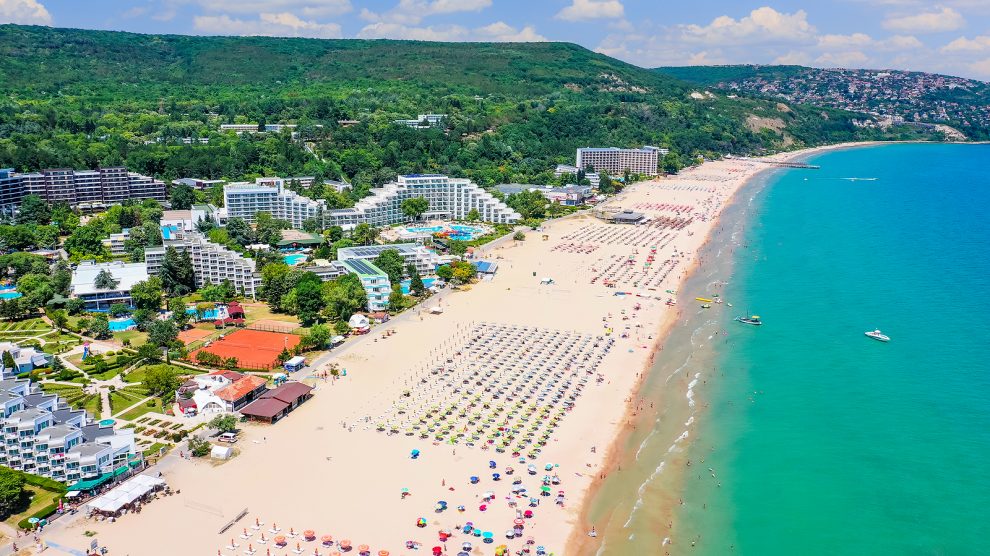
Russia’s brutal war on Ukraine, while and first and foremost a humanitarian tragedy, has caused widespread economic damage across the globe, not least in travel and tourism. Between them, Russian and Ukrainian tourists usually spend around 45 billion US dollars per year on outbound travel, much of it in the countries of emerging Europe.
Hardly had the Covid-19 pandemic abated than Russia invaded Ukraine, providing the travel and tourism sector throughout emerging Europe with yet another challenge.
According to the Economist Intelligence Unit, the war will affect Europe’s tourism industry in four ways: a loss of Russian and Ukrainian tourists; restrictions on airlines and use of airspace; higher food and fuel costs; and a big hit to traveler confidence and disposable incomes.
- EU visa bans for Russian tourists: Time to follow emerging Europe’s example
- The way we travel is changing, and emerging Europe is well placed to take advantage
- Poland tops Emerging Europe’s first Travel Competitiveness Index
The loss of Russian and Ukrainian tourists, who spent a combined 45 billion US dollars per year prior to the Covid-19 pandemic (around eight per cent of the global total), will impact many countries in emerging Europe.
However, some regional experts also see the positive side of decreasing reliance on tourism from Russia in particular.
Loss of tourists in the Baltics?
Estonia, Latvia, and Lithuania could potentially also lose 10 per cent or more of their annual visitors owing to the effective ban on Russian travellers, as more and more countries in the Schengen space are choosing to stop issuing tourist visas to Russian passport-holders.
“The war in Ukraine came as we were all still recovering from the impact of the past two years and tourism numbers were not yet at pre-Covid levels,” Kadri Gröön of Visit Estonia tells Emerging Europe.
She points to a 50 per cent decrease in the number of cruise ships docking in Tallinn as a direct effect of the war. She further argues that this is not a result of fear, but because they could no longer visit St Petersburg, a key attraction for Baltic Sea cruises.
Nonetheless, she is optimistic about the future of the Estonian tourism industry.
“We have heard about the impact of the war as a reason for cancelling group trips, but we have not seen the direct impact of the war in tourism statistics. Passenger numbers have been gradually improving every month,” she says.
Regarding the cruise ships, she states that those ships that do come to Tallinn will stay longer than before. Also, more cruise ships have visited other ports than in previous years, for example Estonia’s largest island, Saaremaa.
It is a similar situation in Latvia.
“The Covid-19 pandemic and war in Ukraine have had an impact on tourism sector, reducing the number of travellers from North America, Asia, Russia, Belarus, Ukraine,” Janis Kovalevskis of the Investment and Development Agency of Latvia tells Emerging Europe .
“The war in Ukraine had an immediate impact on booking figures for the spring and summer season, especially for group segment. A large number of booked group reservations were cancelled during March and did not re-book for the summer season. According to estimates provided by the tourism sector, bookings have been cancelled at around 60 to 70 per cent. Currently, incoming tourism is mainly based on individual travellers and small tourist groups, also domestic travel, and domestic and regional corporate travel.”
She explains that in order to ameliorate the effects of the war, in close cooperation with industry stakeholders, the Latvian tourism marketing strategy has been revisited in order to redefine priority markets and products.
“Due to the geopolitical situation, a large part of our tourism marketing budget now is invested in campaigns in our target markets in Scandinavia and Western Europe. Most of the tourists come from Lithuania, Estonia, Sweden, Finland, Germany, and other European countries,” says Kovalevskis.
Loss of tourists in the Balkans?
Montenegro, which attracted wealthy Russians to its exclusive beach resorts and marinas, has also been predicted to see large drop in tourism-related income, although some Russians have still been making their way to the country through Serbia. Belgrade is one of just a handful of European airports still open to flights from Russia.
In May, the World Bank downgraded Montenegro’s 2022 economic growth forecast to 3.6 per cent from a previous 5.9 per cent, partly due to the expected drop in the number of high-spending tourists.
“Russia and Ukraine represented one of the most important markets for Montenegro as a tourist destination in the last few years, as both were among the top five countries from which the largest number of tourists came. Prior to the war tourists from Russia and Ukraine made up 15.8 per cent of foreign visitors and 21 per cent of those that stay in the country overnight,” Milena Vujović of the National Tourism Organisation of Montenegro tells Emerging Europe .
She says that the country’s tourism industry has encountered a significant change as a result of this crisis, bust still managed to have a successful tourist season by attracting tourists from the region, Western Europe, but also from Israel, Kazakhstan, as well as some new markets for Montenegro, such as Saudi Arabia and Egypt.
“According to our data on the number of tourists since the beginning of this year, on average, we are recording a growth of 9.91 per cent compared to the same period of the pre-pandemic year 2019,” Vujović says.
The Bulgarian Black Sea was another major tourist destination for Russian and Ukrainian tourists, and Deutsche Welle Bulgaria estimates that over 350,000 Russians own property on the country’s seaside.
“In our country, the war had a detrimental effect on tourism. In January we recorded a very high number of bookings for the starting spring and summer season. During this time, we were also experiencing a rather satisfactory winter tourism season. In February, the hostilities in Ukraine started and this stopped virtually all sales,” Pavlina Ilieva, chairwoman of the Future of Tourism Organisaiton which offers independent representation of the Bulgarian tourism industry, tells Emerging Europe .
A government scheme to boost tourism and assist some of the 297,000 Ukrainian refugees that had by the end of May settled or passed through Bulgaria included payments of 20 euros per day for food and accommodation given to hoteliers which hosted over 40,000 refugees in seaside resorts.
However, according to Ilieva the lack of clarity on when the scheme will end made it difficult for those participating to take bookings.

Tourists need not be afraid
lieva further argues that some tourists remain confused over where Bulgaria is located, something that has also contributed to the low number of seaside visitors.
“Some tourists are under the wrong impression that Bulgaria shares a border with Ukraine, and this led to the cancellation of reservations from the Western market.”
Some Bulgarian tour agencies have reported receiving calls from long-term clients from western countries asking if Russian shelling of Ukraine can be heard from Bulgaria.
Kadri Gröön of Travel Estonia is also at pains to point out that currently, there is no military threat to Estonia.
“It is the same distance from Tallinn to Kyiv as it is from Berlin or Vienna. Whilst we do share a border with Russia, we are a proud northern European country, a member of the EU and NATO and just 80 kilometres across the gulf from Helsinki,” she says.
Bulgaria, Estonia, and all other eastern EU member states in-between currently have the lowest (Level 1) travel warning status issued by the US Department of State.
Unlike many news and information platforms, Emerging Europe is free to read, and always will be. There is no paywall here. We are independent, not affiliated with nor representing any political party or business organisation. We want the very best for emerging Europe, nothing more, nothing less. Your support will help us continue to spread the word about this amazing region.
You can contribute here . Thank you.

You may also like
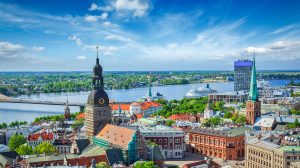
Latvia’s investment promotion success confirms the Baltic state’s upward trajectory

In CEE, policy stifles private investment in energy, and hinders the fight against climate change
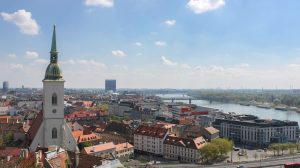
Economy in focus: Slovakia
Add comment, cancel reply.
You must be logged in to post a comment.
Ukraine’s Neighbors Still Attracting Tourists Despite War Raging Nearby

Dawit Habtemariam , Skift
July 5th, 2022 at 2:30 AM EDT
Traveler fears, particularly in the U.S. and Europe, about the danger of the Ukraine War spreading have lessened, allowing for tourism's recovery in Eastern Europe to continue. Industry stakeholders still have to vigilantly reassure and educate travelers about the safety of their destinations.
Dawit Habtemariam
The ongoing war in Ukraine is not having a dramatic impact on tourism to the countries bordering the conflict. With fears of the conflict spreading weakening, tourists feel comfortable with continuing their trips to the region.
The biggest impact of the conflict on tourism to the region came in late February, when Russia invaded Ukraine with the support of Belarus. “We did see an impact right away from the conflict,” said Globus Chief Marketing Officer Steve Born. In March and April, the tour operator saw a 10 percent slowdown in forward bookings for the region, particularly its cruises in the Eastern Danube.
There was general uncertainty about how far the conflict would spread and its impact on demand. “When the war started, we didn’t know what impact it would have on neighboring countries,” said Explore Worldwide Director Sam White.
Travelers changed their plans to go to countries closer to home like Western Europe or North America or simply moved their bookings for a later date. Globus saw a 15 percent gain in 2023 early bookings for the region, according to Born. “It didn’t turn off the valve of new demand, it just shifted it,” he said.
“When the war broke out in February, we saw that people’s confidence dropped drastically,” The Polish Tourism Organization said in a statement.
Heading into the summer, fear about the conflict spilling over lessened. In May, 54 percent of American travelers said they were worried about the conflict spreading to other parts of Europe, a drop from 62 percent in March, according to MMGY Travel Intelligence’s recent survey .
The U.S. State Department’s travel advisories currently warns U.S. citizens to exercise normal precautions when visiting Hungary , Romania , Slovakia and Poland with no mention of the conflict.
Only Belarus and Moldova have received heightened danger travel warnings. U.S. citizens are advised to not travel to Belarus due “arbitrary enforcement of laws, the risk of detention, the Russian military attack on neighboring Ukraine, and the buildup of Russian military in Belarus along the border with Ukraine.” In the case of Moldova, U.S. travelers are warned to reconsider travel due to the conflict, ongoing refugee crisis and the fact that the country remains in a state of emergency .
Europeans have not been deterred. Only 10 percent of Europeans changed their travel plans to avoid countries neighboring the conflict zone, according to a recent European Travel Commission survey of 6,000 respondents with trips scheduled in the next six months.
“As the war came into the fifth month, people have learned that Poland is safe as ever, all tourist attractions, hotels and restaurants operate as usual, and their confidence has happily restored,” The Polish National Tourist Office said. While group tourism to Poland is still negatively impacted, individual visitations have continued in “great numbers,” according to the organization.
In some countries, the conflict has not taken away optimism for a strong recovery. “The local authorities and hospitality industry are eagerly anticipating a strong tourism recovery, in 2022, following the easing of Covid-19 restrictions, “according to Romania Tourism’s website .
If anything, higher airfares and poor airport operations are likely having a stronger impact. “When I look at the numbers for Eastern Europe, they are not higher than what we are seeing in other destinations, but they are not off skewed from what we are seeing for long haul destinations,” said G Adventures Vice President of Product Yves Marceau. “I think higher airfares and air fiascos are having a bigger impact than anything else.”
To be sure, industry stakeholders are working to reassure travelers that their destinations are safe. This summer, The Poland Tourism Organization launched a #PolandVibes social media campaign, part of which aims to reassure tourists of the country’s safety.
The flow of tourism to and within the region is not as smooth as it once was. Travel agencies and tour operators have suspended multi-country trips that include the warring countries—Russia, Ukraine, Belarus. “Where we’ve had trips that are multicounty like for both Russia and Poland, for example, we’ve had to cancel trips that go to both,” White said.
In some countries, there’s been an increased tightness on the use of public services. “The amount of traffic on rail and public transportation has definitely increased in those countries,” said Marceau. “We’re hearing from our staff on the ground it’s a lot of refugees trying to come away from the border or relocate to within the country.”
Tour operators have had to adjust transportation offerings. “We had one trip where we made the decision to move from an overnight train to a private transfer overnight in Romania,” said Marceau. “Part of the reason was the demand for cabins was so high we struggled to get sleeper cars for passengers.”
The Daily Newsletter
Our daily coverage of the global travel industry. Written by editors and analysts from across Skift’s brands.
Have a confidential tip for Skift? Get in touch
Tags: demand , eastern europe , Ukraine War
Photo credit: People walking in Krakow, Poland Jacek Dylag / Unsplash

How the Ukraine invasion flattened Eastern European tourism
Julia Buckley, CNN
August 6, 2022, 4:08 AM
- Share This:
- share on facebook
- share on threads
- share on linkedin
- share on email
When frequent flier Julie booked a clutch of trips to Warsaw last year, she was expecting to spend her weekends in the Polish capital sightseeing, strolling around its parks, and eating pierogi.
But by the time the date of the first trip — June 2022 — rolled around, people around her weren’t so sure she should be going.
“My mum and a couple of friends said, ‘Warsaw’s quite close to Ukraine, aren’t you worried?'” she says.
She wasn’t. “I had no hesitation,” she says.
Julie — who preferred not to give her full name — has now visited Warsaw four times in six weeks, and has fallen for the city.
“It’s a fascinating place with so much history,” she says.
“The Old Town was rebuilt after the war and it’s beautiful. It has lovely parks, the weather’s good in summer — it’s a fabulous place, and the people are very friendly. I’m going back tomorrow — I don’t think there’s any legitimate concerns at all.”
Sadly, not every potential traveler feels the same way as her. Not only does Poland share a border with Ukraine, but pictures of refugees crossing the border seem to be increasing the proximity in people’s minds, to devastating effect for its travel industry.
At the end of March, Poland’s deputy minister for sport and tourism, Andrzej Gut-Mostowy, told media that cancelations from foreign visitors were up between 30% and 40%. His department did not respond to a request for comment.
European airline Jet2 even suspended flights to Poland in March. They will start up again in September — just too late for the summer vacation crowd.
It’s a trend that can be seen across the whole of Eastern Europe. Tour operator Last Night of Freedom , which arranges bachelor and bachelorette parties across Europe has seen bookings to Poland’s Krakow collapse by 60% for summer 2022.
“I think when the invasion started, people were hearing about bombs close to the border, and now they have that image in their head,” says founder Matt Mavir.
“But you should write that off. If Russia started bombing NATO countries, you going to Poland would be the least of your worries.”
Personal safety isn’t the only reason people are staying away.
“People are saying they don’t want to go somewhere and be seen to be having fun in a place where they perceive there to be a lot of refugees.
“Someone lost their home and you’re there in matching t-shirts, drinking beer — there’s a juxtaposition that doesn’t sit right.”
Brit Nicola Trup, who visited family in Warsaw in July, says that this image of ugly tourists larking around as refugees watch on simply isn’t true.
“It did perhaps seem a little quieter than usual in terms of international tourists, and I definitely noticed more Ukrainian being spoken.” Although, as she points out, if you don’t speak Polish or Ukrainian, you wouldn’t be able to tell.
Giulia Mulè, a blogger in Wrocław, agrees.
“Ukrainians have been in Poland forever — they’re neighboring countries,” she says.
“In March and April there were a lot of initiatives and centers giving out donations. If you knew where they were you’d see queues of mothers and kids at certain times of day. It was sad, but also nice to see a lot of places were helping. And it’s not like it would affect your holiday. The railway stations were set up as refugee points, but it’s not like that now.”
As for safety worries, Mule says: “If you think about it rationally, there’s absolutely no risk.”
A region-wide crisis
It’s not just Poland, either. Last Night of Freedom says that its bookings to Budapest in Hungary have fallen by 45% and to Riga, Latvia, by 39%.
The Hungarian Tourism Agency’s figures show a 37% drop to the country in the first six months of 2022, compared to 2019. Americans are down 65%. It says numbers are rising, and it hopes to see the end of the year just 10% down.
Slovakia, which shares a border with western Ukraine, has seen foreign visitor numbers plummet by 49% compared to 2019, according to figures from its tourist board for January to May. “It’s hard to say how many didn’t visit because of the fear of the pandemic and how many are worried about conflict in Ukraine,” said a spokesperson. Capital Bratislava sits on the border with Austria, an hour from Vienna — and 16 hours from Kiev. Yet the shared border is enough to scare people off.
The situation is even affecting countries that do not share a border with Ukraine. Liina Maria Lepik, director of the Estonian Tourist Board, says that half of the 350 cruise ships scheduled to visit Tallinn in 2022 have been canceled “as a direct effect of the war” — because they can no longer stop at the prime Baltic cruise destination, St. Petersburg.
It’s not all dire news. “We have heard about the impact of the war as a reason for canceling group trips, but we have not seen the direct impact of the war in tourism statistics,” says Lepik. “Visitor numbers have been gradually improving every month” — though she adds that they are not near pre-pandemic levels yet.
‘It will never be this cheap’
Not everyone is so lucky. In January, Jacek Legendziewicz was hoping 2022 would be the year his Krakow-based hospitality company, Jordan Group , recovered from the pandemic. But then came the invasion — and they lost 80% of group bookings in three days.
“There was a need to immediately accept refugees from Ukraine, and this partially filled the hotel,” he says.
“To function, however, we needed normal tourists.”
Even now, although Poland’s tourist board’s figures say visitor numbers are increasing, Legendziewicz — who is also the deputy director of the Chamber of Hotels in Małopolska province — is still having problems. Only his conference guests are continuing normally, while foreign visitor numbers “very slowly growing.” Foreign guests are down 60%. “The result is three times worse than in 2019,” he says.
“I keep hearing that Poland, Krakow are too close to the war.” He is planning a new slogan: “There never was, and there never will be as cheap as now.”
As Matt Mavir says, “By staying away, it’s hurting these places more than the actual war itself. If people could get behind [Poland] and visit, it’d help across the border, too.” His company is donating 10% of the profits of any trip to Poland to refugee charities on the ground.
The regional winners
Interestingly, two countries in the region are seeing an increase of tourists. Moldova, which borders Ukraine, saw more foreign visitors in the first quarter of 2022 than pre-pandemic, going from 31,000 non-resident tourists in 2019 to 36,100 in 2022.
Meanwhile Lithuania — which borders Russian allies Belarus and the Russian exclave of Kaliningrad Oblast — says that by June, visitor numbers were at 88% of 2019 levels. Those “visitors” include Ukrainians fleeing the conflict, but numbers from Latvia, UK and the United States are all up.
Even Poland, with its 25% drop in overall tourism from February to May 2022, saw a 20% increase in US visitors. A spokesperson for the Polish Tourist Board told CNN that Poland’s abolition of masks, isolation and quarantine rules in March “should be taken into account.”
A ‘geopolitical zombie’
Although Poland’s American numbers are looking good, the situation overall is not so rosy.
“The situation has become very unstable and unpredictable,” says Wojtek Mania, from the Poznań Tourism Organisation.
“It’s really frustrating and infuriating that politics is influencing tourism, which helps people gather together.”
The city doesn’t have figures for 2022 yet, but Mania says that “the influence of war is very intense.” And while the situation for independent travelers isn’t as bad, group travel has fallen off a cliff.
As the invasion started, Scandinavian countries and Spain canceled bookings, he said. Then the UK joined them, and tour operators canceled trips “in really big numbers.”
He says, people are “not considering the geography” and are lumping an entire region together. In fact, he says, the idea of “Eastern Europe” and “Western Europe” is a throwback to Soviet times — and those concepts are so entrenched in the public consciousness that it’s overruling simple geography, and facts.
“We are over 30 years since the collapse of the Soviet Union and suddenly it’s like a geopolitical zombie that’s influencing industries like tourism in central-eastern Europe,” he explains.
“The war started by Russia has affected a whole region and continent.”
Dorota Wojciechowska, director of the Poland Tourism Board in London, points out that cities such as “Krakow, Gdansk, Wrocław, Poznań and Warsaw… are all located hundreds of miles away from the border with Ukraine.
“The distance between Krakow and Kyiv is like the distance between London and Madrid.” Individual travelers from the UK are starting to return, she says.
The aim, says Mania, is to “focus on informing people we are safe. That we are not in a state of war, we’re not on the front line, and you don’t have crowds of refugees camping on old town squares. Nothing is going on on the streets.”
The problem? “Tourism is based on emotions, and rational arguments are not reaching people because they have these feelings, so it’s difficult to get through.”
The lure of the bucket list
There might be another factor bringing down numbers — that after two years of the pandemic, the “ revenge travel ” movement is seeing people book bucket list trips, meaning that prime destinations are buckling under pressure while lesser known places are overlooked.
That’s one theory of Tom Smith, regional general manager for Europe at Intrepid Travel . Its bestselling trips this year are a Danube cycle tour and Best of Central Europe, taking in Austria, the Czech Republic, Hungary, Slovakia and Poland. In 2019, they were Russia, and a long trip around Moldova, Ukraine and Romania.
“This is more about post-pandemic trends rather than the war,” he says. “People have spent months thinking about where they’ve always wanted to visit so it’s not surprising that they are opting for trips that take in the ‘big hitters’ of Central and Eastern Europe.”
Having said that, Smith reckons that Poland and Romania have seen an irrefutable drop related to the invasion.
“I traveled to Romania recently and although there were some tourists, locals told me that they’ve seen a big drop-off in tourism, especially around the Danube Delta area, closest to Ukraine.”
He adds: “When the invasion first happened there was nervousness about traveling to Eastern Europe in general. Now people have seen that the war is contained to Ukraine, they’re feeling more confident. But when it comes to the countries bordering Ukraine, there is still some reticence.
“Unfortunately this is at a time when local people need tourism more than ever, as they recover from the pandemic. People might not be sure if it’s appropriate to visit — but by traveling to those countries, you are supporting their efforts to help Ukrainian refugees.”
Go now to help out — and enjoy
What’s more, these are beautiful places to visit in their own right, adds Mulè.
“Late summer, early fall is one of the best times to go. It’s really warm, sunny but not too hot. There are mountains, seaside, cities… and although prices are going up, if you’re paid in pounds or dollars, you’re going to go out for a really good meal and laugh when the check comes.”
And if you’ve been wondering what you can do to help Ukraine, she says, visiting these countries would be a good start.
“In Poland we’ve welcomed millions of refugees. It’s a big increase in the number of people accessing Polish services. So the more you support Poland, the more you’re supporting Ukraine.”
In Poznań, Mania agrees.
“We had a big Ukrainian minority before the war, and it’s bigger now. Lots work in hospitality, hotels, restaurants — if you’d like to support refugees, support them by coming to Poland, and look for Ukrainian restaurants, or places where they work.
“That way you can support tourism and also refugees, trying to build their new lives.”
Related News
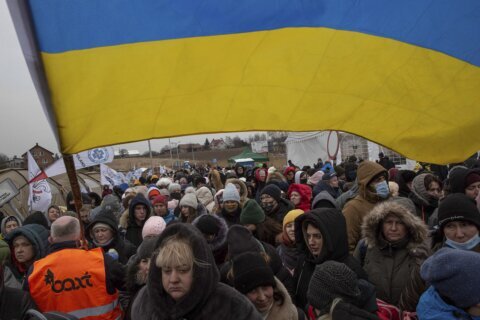
With men at the front lines, women watch over Ukraine’s night sky for Russian drones
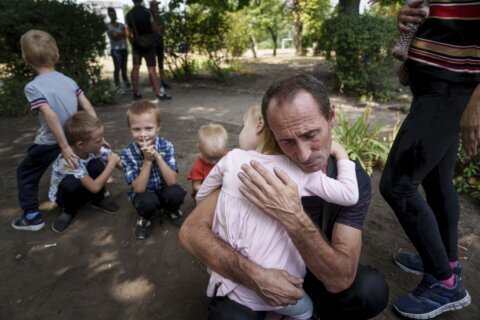
Ukraine somberly marks 33 years of independence as war with Russia rages on
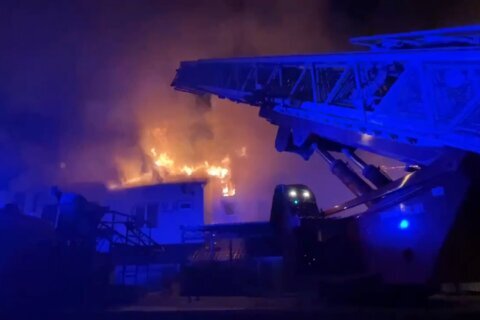
5 killed by Russian strike as Moscow continues its latest push in Ukraine’s east
Recommended.

'Everybody needs to know how great a man he was': Friend pays his respects to fallen DC officer

Labor Day weekend forecast a mixed bag that includes humidity, storms and some 'fantastic weather'

'The world's not as bright a place without him': A Bowie man’s family continues to look for answers a year after he was attacked and killed
Related categories:.
Advertisement
Supported by
Putin Plans First Visit to I.C.C. Member State Since Arrest Warrant
The Russian president will travel to Mongolia, a member of the International Criminal Court, which issued a warrant for his arrest in 2023.
- Share full article

By Eve Sampson
President Vladimir V. Putin of Russia is scheduled to visit Mongolia next week, the Kremlin said on Thursday, despite the Central Asian country’s membership in the International Criminal Court, which issued a warrant for his arrest last year.
Mr. Putin plans to visit the country on Sept. 3 on the invitation of Ukhnaagiin Khurelsukh, the president of Mongolia, to commemorate the 85th anniversary of a joint military victory, the Kremlin said in a statement . It will be the Russian president’s first trip to an I.C.C. member nation since March 2023, when the court accused him of war crimes in Ukraine and issued a warrant for his arrest.
As part of their membership in the I.C.C., countries are bound by international law to arrest people for whom the court has issued arrest warrants (though that requirement is not always observed).
Here is what to know about the trip.
Will Mr. Putin be arrested?
The Kremlin does not appear to be concerned about Mr. Putin’s security on the trip.
“There are no worries. We have excellent dialogue with our friends in Mongolia,” Dmitri S. Peskov, the spokesman for the Kremlin, said in an interview posted to Telegram, a messaging platform, on Friday, adding that “all aspects of the visit were carefully prepared.”
Mongolia’s Foreign Ministry announced the visit in a news release on Friday.
Mr. Putin is unlikely to face arrest if he is invited into the country, said David Scheffer, a former U.S. ambassador and a chief negotiator of the statute that established the I.C.C. Instead, he added, the Russian president is likely to use the visit to “propagandize and taunt the I.C.C. and Ukraine.”
Mongolia is the country taking a real risk, Mr. Scheffer said, and it is likely to face diplomatic pressure from the I.C.C. and other member states to rescind the invitation. “Mongolia may be jeopardizing some trade and development assistance with other I.C.C. members, as well as diplomatic sanctions, if it entertains Putin without handcuffing him,” he said.
The Ukrainian Foreign Ministry called on Mongolian officials to arrest Mr. Putin in a statement on Friday.
Mongolian and I.C.C. officials did not immediately respond to a request for comment.
This is not the first time an I.C.C. member state would stand to face backlash should it fail to arrest someone for whom the court has issued a warrant, said Mr. Scheffer, who pointed to Omar Hassan al-Bashir , the former president of Sudan.
The court issued warrants for Mr. al-Bashir’s arrest in 2009 and 2010, charging him with genocide, war crimes and crimes against humanity. He eluded arrest in South Africa and Jordan , both of which are I.C.C. member states, though the trips drew international condemnation.
What is Russia and the I.C.C.’s relationship?
A little over a year after Russia invaded Ukraine, the court accused Mr. Putin and Maria Lvova-Belova, a top Russian official, of abducting and deporting children from Ukraine, which is a member of the I.C.C., during Russia’s war there. Russian officials have denied the charges.
In June, the court issued arrest warrants for two Russian security officials in connection with strikes against civilian targets.
The I.C.C. was established in 2002 to prosecute people for crimes against humanity, war crimes and genocide under the Rome Statute, a 1998 treaty. Before its creation, the United Nations Security Council hosted ad hoc tribunals to prosecute atrocities in places like the former Yugoslavia and Rwanda.
More than 120 countries are members of the I.C.C.; the United States is not. But the court cannot try defendants in absentia and has no way to force an accused individual to stand trial. Instead, it relies on officials in member states to detain suspects so they can stand trial in The Hague. Russia, which is not a member of the court, says it will not surrender its own officials.
Mr. Putin previously skipped a long-planned summit with heads of state from Brazil, China and South Africa after South Africa, the host country, faced mounting pressure over its warm relations with the Kremlin. Sergey V. Lavrov, the Russian foreign minister, attended the August 2023 meeting in Mr. Putin’s place.
Oleg Matsnev contributed reporting.
Eve Sampson is a reporter covering international news and a member of the 2024-25 Times Fellowship class, a program for journalists early in their careers. More about Eve Sampson
Our Coverage of the War in Ukraine
Russia’s Bombing Campaign: Moscow’s far-reaching bombardment of Ukraine , which President Volodymyr Zelensky has called one of the largest since the war began, eased after two nights of deadly barrages .
Mine-Detecting Drones: Ukraine has become a beta test for embedding A.I. and other new technologies in drones and robots to find deadly land mines.
Ukraine’s Poetry Boom: With verses that capture the raw emotions of the war and resonate deeply with the population, Ukrainian poets have emerged as some of the country’s most influential voices .
Modi’s Kyiv Visit: Prime Minister Narendra Modi of India visited Kyiv, furthering a diplomatic effort by Ukraine to engage non-Western nations in potential settlement talks with Russia.
How We Verify Our Reporting
Our team of visual journalists analyzes satellite images, photographs , videos and radio transmissions to independently confirm troop movements and other details.
We monitor and authenticate reports on social media, corroborating these with eyewitness accounts and interviews. Read more about our reporting efforts .

IMAGES
VIDEO
COMMENTS
The war in Ukraine has pushed the European travel industry into yet another phase of uncertainty, worrying business owners and workers already concerned with rising fuel prices, supply chain ...
Those "visitors" include Ukrainians fleeing the conflict, but numbers from Latvia, UK and the United States are all up. The best things to do in Estonia's capital, Tallinn. Even Poland, with ...
Summary impacts on European travel. 1. Direct impacts of lost Russian travel with no-fly zones and lingering sanctions including lasting impacts on the Ruble 2. Wider economic impacts of sanctions means o higher inflation will erode income and expected consumer-lead recovery o rising oil costs will lead to higher air fares while longer routes ...
Russia's military offensive in Ukraine represents a downside risk for international tourism. It has exacerbated already high oil prices and transportation costs, increased uncertainty and caused a disruption of travel in Eastern Europe. The destinations most impacted so far (aside from Russia and Ukraine) are the Republic of Moldova with a 69 ...
By Elaine Glusac. March 9, 2022. Just as the travel industry was seeking to climb out of a two-year depression, Russia's assault on Ukraine has scrambled schedules and given Americans pause as ...
Alexey Maishev/Sputnik via AP. CNN —. Russia's invasion of Ukraine has spurred travel interruptions across the globe. The European Union closed all airspace across its 27 countries to Russian ...
According to agency data provided to NPR, domestic tourism, which the agency defines as leaving your home city for leisure, increased 24% between 2019 and 2021. Nearly 4.2 million foreign tourists ...
Two years after the invasion of Ukraine began, UNESCO has published a new assessment of the impact of the war on the country's culture and tourism sectors. The total cost of the damage to these sectors is estimated at nearly $3.5 billion, and nearly $9 billion will be needed over the next ten years to enable them to recover.
Prior to the pandemic, Russia and Ukraine accounted for 5% of the global tourist departures. Russia was also the world's 11th biggest source of tourists and seventh-biggest spender. This report explores how Russia's invasion of Ukraine will affect the tourism and travel sector in Europe this summer and throughout 2022. Download report.
The direct and indirect impacts of the Russia-Ukraine war on European tourism are becoming clearer, while also difficult to predict far into the future — and it's a mixed bag of both good and ...
War has decimated tourism in Ukraine, but people are still determined to travel The Carpathian Mountains are a wildly popular domestic getaway spot for Ukrainians in the summer. But Russia's ...
CNN —. The Covid pandemic caused the Hotel Leopolis in Lviv, Ukraine, to close for two months in 2020. Yet, since then, and a little more than a year after Russia invaded, the Leopolis has ...
The tourism industry was awaiting early 2022 to bounce back from pandemic-related losses. In January 2022, European tourism was expected to return to pre-pandemic levels as soon as in 2023, but the Russia-Ukraine conflict that broke out in late February has compelled it to downgrade that forecast. The following three tourism-related aspects are ...
"The Covid-19 pandemic and war in Ukraine have had an impact on tourism sector, reducing the number of travellers from North America, Asia, Russia, Belarus, Ukraine," Janis Kovalevskis of the Investment and Development Agency of Latvia tells Emerging Europe. "The war in Ukraine had an immediate impact on booking figures for the spring and ...
Travel and security experts say there's no need to start canceling trips to Europe. But travel insurance, flexible booking policies and contingency plans are more necessary than ever.
Skift Take. Traveler fears, particularly in the U.S. and Europe, about the danger of the Ukraine War spreading have lessened, allowing for tourism's recovery in Eastern Europe to continue.
Andrea Mantovani for The New York Times. HELSINKI — A year ago, the day Russia invaded Ukraine and set in motion a devastating European ground war, President Sauli Niinisto of Finland declared ...
Ukraine war: Europe fights to maintain solidarity. Joe Biden's surprise visit to Ukraine on Monday is a striking show of solidarity - an intentionally powerful message to Moscow - as Kyiv prepares ...
And other questions. Russian troops are trying to take Ukraine's two biggest cities, Kyiv and Kharkiv, but are meeting stiff resistance. Meanwhile, an estimated half a million refugees have fled ...
As boycotts and sanctions hit Russia, the global travel industry strives to deliver its own response to the invasion of Ukraine. Tour operators and cruise companies are freezing trips to Russia ...
Russia has launched one of its biggest air attacks on Ukraine of the war so far, the head of the Ukrainian air force has said. At least seven people were killed and dozens wounded as missiles and ...
Moldova, which borders Ukraine, saw more foreign visitors in the first quarter of 2022 than pre-pandemic, going from 31,000 non-resident tourists in 2019 to 36,100 in 2022. Meanwhile Lithuania ...
Authorities in Europe, the US and Canada barred arrivals by Russian airlines to voice opposition to the Ukraine war, and Russia responded by closing its airspace to 36 countries, mostly in Europe.
It will be the Russian president's first trip to an I.C.C. member nation since March 2023, when the court accused him of war crimes in Ukraine and issued a warrant for his arrest.